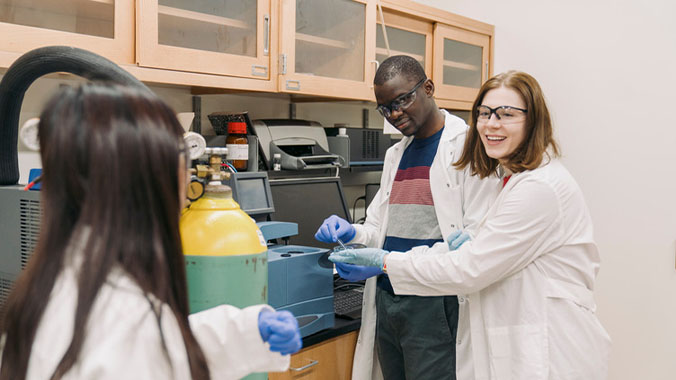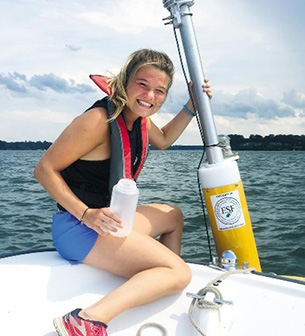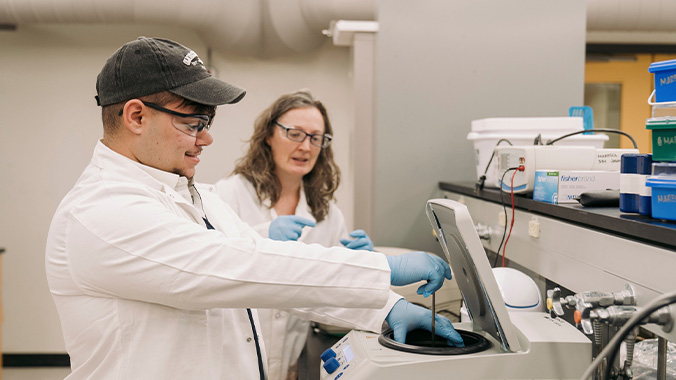DEPARTMENT OF Chemistry
Chemistry
Gain a strong foundation in the traditional areas of chemistry, then add strength in one of three options.
In pursuing a Bachelor of Science in Chemistry, students receive a strong foundation in analytical, physical, organic, and inorganic chemistry before selecting one of three options leading to the degree: biochemistry and natural products, environmental chemistry, or natural and synthetic polymer chemistry.
Each option offers an advanced course of studies beyond the basic courses of the classical undergraduate chemistry curriculum.
Our courses demonstrate the interconnectedness of environmental concerns.
Through laboratory courses and research, students use their foundational knowledge to explore specialized areas of chemistry and gain familiarity with the actual practice of chemistry.
In the final two years of the program, students must select one of three Option Areas:
- Biochemistry and Natural Products
The Biochemistry and Natural Products option stresses a chemical approach to problems in the life and health sciences. - Environmental Chemistry
Learn strategies to stress applications of fundamental chemical principles to describe and predict behavior of chemicals in the environment. - Natural and Synthetic Polymer Chemistry
Gain an excellent background both for direct entry into industrial chemistry and graduate study in areas such as chemistry, biotechnology, or polymer science.

Learn more about Chemistry Option Areas
The Biochemistry and Natural Products option stresses a chemical approach to problems in the life and health sciences. Students investigate cutting-edge topics such as synthetic biology, genomics, and metabolic engineering.
Undergraduates in the Biochemistry and Natural Products option take advanced courses in the following areas:
- Biochemistry I (Amino acids, proteins, and nucleic acids)
- Biochemistry II (Metabolic cycles, electron transfer, photosynthesis)
- Biochemistry Laboratory
Students can select a range of specialty courses taught by our faculty: Drugs from the Wild, Plant Biochemistry, Natural Products Chemistry, and Advanced Instrumental Analysis. Professional electives in physiology, chemical ecology, toxic health hazards, medicinal chemistry, genetics, and molecular biology strengthen connections in the life and health sciences.
The senior year culminates in a research project designed together with one of the chemistry faculty. This gives students the opportunity to apply biochemical principles and techniques to address open questions in science.
ESF's chemistry programs aim to prepare the scientists of the future. The Biochemistry and Natural Products option provides particularly good training for students aiming for professional degrees in chemistry and biomedical fields or careers in natural products chemistry, drug discovery, biotechnology, forensics, and biomedical sciences.
The Environmental Chemistry option stresses applications of fundamental chemical principles to predict the chemical behavior in the environment. Students study and investigate environmental topics on scales ranging from local to global, covering topics ranging from toxic algal blooms, air and water quality, persistent organic pollutants, and global climate change.
Undergraduates in the Environmental Chemistry option take advanced courses in the following areas:
- Aquatic Chemistry
- Atmospheric Chemistry
- Methods of Environmental Chemical Analysis

Students take advantage of a range of specialty courses taught by our faculty, including Environmental Sampling, Oceanography, and Introduction to Atmospheric Sciences. Students also have the opportunity to explore a wide variety related discipline, such as ecology, engineering, environmental policy, and sustainability.
The senior year culminates in a research project designed together with one of the chemistry faculty. This gives students the opportunity to apply the principles and techniques of chemistry to open problems in environmental chemistry.
ESF's Chemistry degree aims to prepare students for both immediate employment and further education. The Environmental Chemistry option offers particularly good training careers in forensics, analytical chemistry, and environmental science.
Students in the option area of Natural and Synthetic Polymer Chemistry study and develop new technologies and materials for addressing challenges associated with climate change, environmental pollution, and sustainability.
Undergraduates in the Natural and Synthetic Polymer Chemistry option take advanced courses in the following areas:
- Polymer Synthesis and Mechanisms
- Polymer Techniques Laboratory
- Polymer Properties and Technology
Students can take advantage of a wide variety of courses in mathematics, statistics, biotechnology, engineering, and biochemistry.
The senior year culminates in a research project designed together with one of the chemistry faculty. This gives students the opportunity to apply the principles and techniques of polymer chemistry to open problems in polymer chemistry.
ESF's chemistry courses and programs of study aim to prepare the scientists of the future. The Natural and Synthetic Polymer Chemistry option provides particularly good training for students aiming for careers in industrial chemistry and graduate study in areas such as biotechnology or materials science. This includes finding solutions to environmental problems such as long-lasting plastics, water contamination, and climate change.
Exciting opportunities for undergrads.
Join the ESF Honors Program
Open to juniors who have completed at least 60 credit hours with a cumulative GPA
of 3.5.
Advising for Pre-Professional Programs
ESF offers pre-professional advising in medicine, dentistry, veterinary science and
law. Get more information on each of these pathways and an online information request
form.
Be Part of The Alchemist Society
Chemistry students have social events, and travel to schools and museums to show off
the magic of chemistry to young people.
Awards for Students in the Chemistry Department
The Department of Chemistry has a long history of providing many need and merit-based scholarships each year, made possible by very generous contributions made to both ESF and the department.
Enhance your education and global awareness by studying abroad. Fulfill electives, general education, or research requirements in an international setting.

Chemistry Degree Outcomes
ESF's chemistry courses and programs of study are aimed at preparing the scientists of the future. All options are excellent grounding for professional work at the B.S. level or for advanced graduate study.